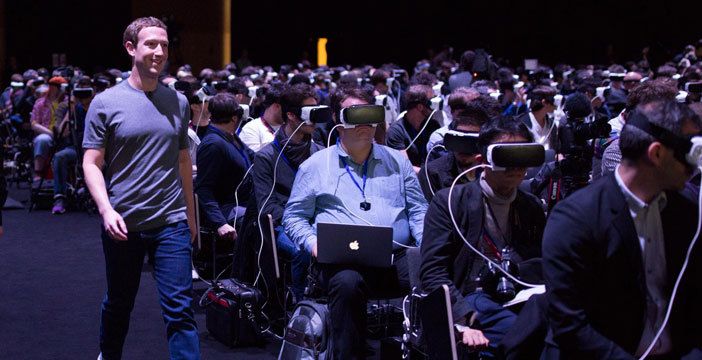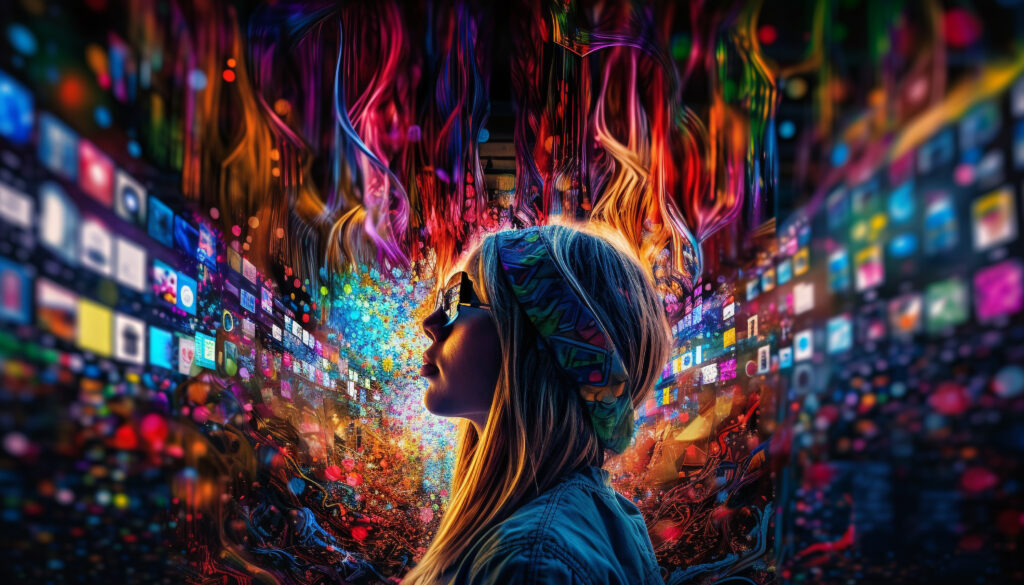What is the “new” metaverse and why does it concern us all?
 It’s an extremely current buzzword. Since Mark Zuckerberg decided to announce to the world that his company is decisively investing in the development of the metaverse, everyone is talking about it. Mark, being the skilled communicator that he is, emphasized this change by announcing EVEN the change of his company’s name: from “Facebook” – a globally recognized brand – to “Meta.” It really couldn’t have been more explicit. It’s not news for those operating in the digital industry that traditional social networks, like Facebook, are experiencing a plateau, not growing or innovating. Mark and his leadership team know this well, which is why they have been busy acquiring new social media, like WhatsApp, and new technologies, like Oculus Rift. Communicatively, such a HUGE boom had never been heard before. There had been attempts, mostly unsuccessful, to make a dent in mass distraction. We all remember this photo.
It’s an extremely current buzzword. Since Mark Zuckerberg decided to announce to the world that his company is decisively investing in the development of the metaverse, everyone is talking about it. Mark, being the skilled communicator that he is, emphasized this change by announcing EVEN the change of his company’s name: from “Facebook” – a globally recognized brand – to “Meta.” It really couldn’t have been more explicit. It’s not news for those operating in the digital industry that traditional social networks, like Facebook, are experiencing a plateau, not growing or innovating. Mark and his leadership team know this well, which is why they have been busy acquiring new social media, like WhatsApp, and new technologies, like Oculus Rift. Communicatively, such a HUGE boom had never been heard before. There had been attempts, mostly unsuccessful, to make a dent in mass distraction. We all remember this photo.
It made an impact. Like a boomerang could. Most people in this image saw only thousands of people sitting and immersed in the metaverse with Oculus, “obscured” by virtual reality, “remote-controlled” by the only man without Oculus Rift happily walking in what we know as the reassuring “reality.”
Even the Big ones make mistakes. Mark, don’t take it personally. Since the announcement, the users and investments of the already known and operating Metaverses in the industry have multiplied. Decentraland, Sandbox, Roblox have received a wave of attention from the whole world.
When does the Metaverse start? Well, it’s already started and it’s moving fast!
“What is the metaverse?”, “What is its relationship with NFTs, blockchain, bitcoins (or ethereum)?”, “What is a DAO?”, “What can you do in the Metaverse?”. These are just some of the topics that are captivating the whole world. In this blog post, I would like to focus on the relationship between the metaverse and gamification.
But in the metaverse (or in the metaverses), does gamification exist?
 I would say yes, and I would say beyond. I would say that metaverses are born from an overlap of different levels. Imagine the metaverse as an image with different layers in Photoshop. The artist can work on each of them separately, but together, all the layers have a harmony and effectiveness that the individual layer cannot provide.
I would say yes, and I would say beyond. I would say that metaverses are born from an overlap of different levels. Imagine the metaverse as an image with different layers in Photoshop. The artist can work on each of them separately, but together, all the layers have a harmony and effectiveness that the individual layer cannot provide.
The metaverse is similar. Composed of different levels:
- one of them is certainly represented by the interactions and social needs for entertainment, knowledge, friendship, etc. It is the level where “traditional” social networks operate, for example.
- Another level is made up of the game and its rules, role-playing, the power of empathy; we can see some of these elements in the creation of our avatar, in the construction of a simplified, colorful, and interactive world that, unlike the real world, always puts the user and their needs at the center. Other typical elements of gaming and gamification can be found in the use of components such as badges, points (currency), progress bars, etc…
That the metaverse “uses” gamification is certain. But I would like to go a little further.
- Metaverses are, in fact, the children of noble fathers who have their roots in the game.
- The first MUDs – Multi-User Dungeons – were nothing more than persistent game worlds where it was possible to interact – with AI and later with other players, direct descendants.
- The MOOGs, or Massively Multiuser Online Games, differed from other online games because their environment is perpetual.
- MMORPGs, Massively Multiuser Online Role Playing Games, represent the role-playing evolution of the online gaming world.
The refinement of these worlds, their evolution, or rather their evolutions, aimed at covering different entertainment needs and different types of audiences – the typical Fortnite player has really little to do with the typical World of Warcraft player, at least from the point of view of the user type – have determined an ever-increasing interest and a growing diffusion of these products, which could now be called “Metaverses,” has determined the growth of this sector.
But does the metaverse differ from what we use for…?

The metaverse is an evolution of gaming universes and brings with it their paradigms, simulacra, abstractions, interfaces, and often their metaphors and practically always their logics.
It must be said that the metaverse is also something else. It promises to solve problems we have in our old and boring “reality.” Just like gamification, which always operates on the border between the gaming world and the real world. I have no intention of trivializing an ongoing epochal change or predicting its evolutions. Whoever tries it now is either crazy or very, very clever, and I don’t have the card for either club.
But one thing is certain: metaverses don’t “use” gamification or games. They are part of its evolution. And they have just been born; who knows how many they will stir up.

